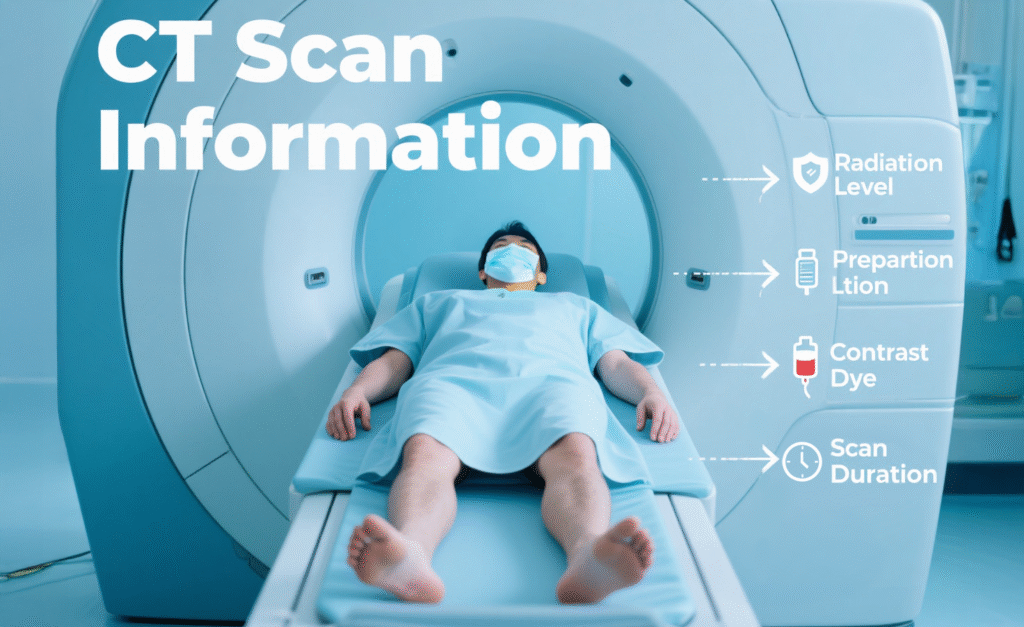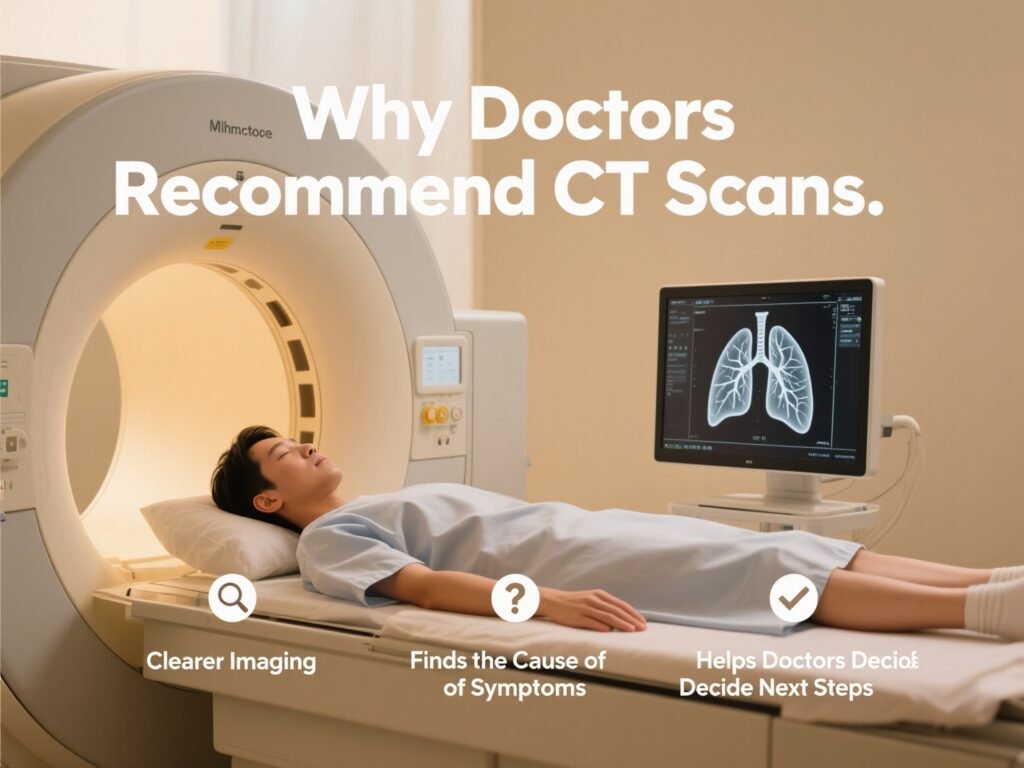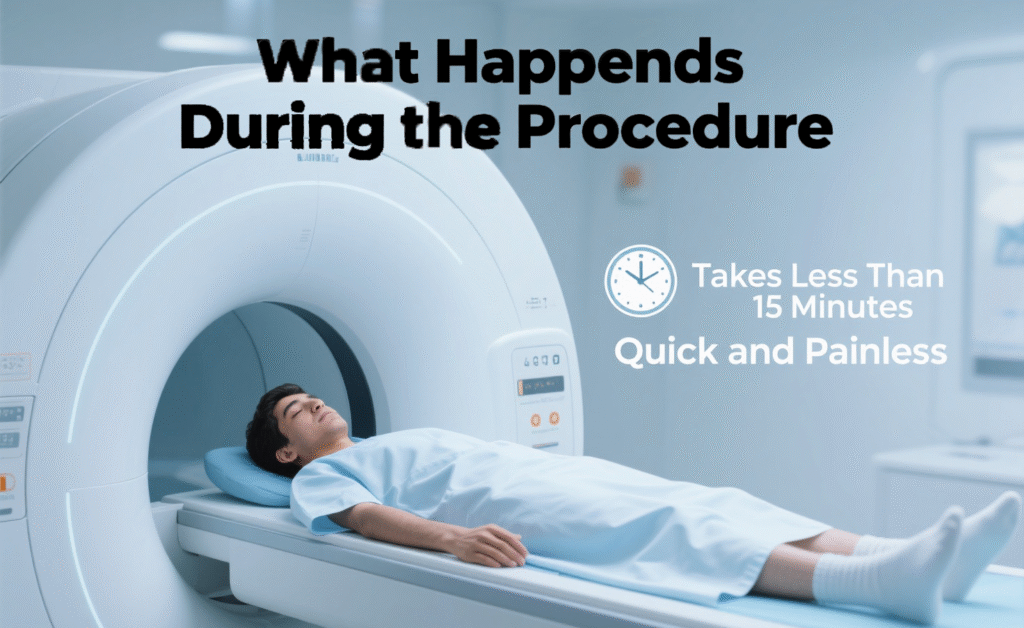What You Should Know Before Getting a CT Scan at a Hospital

If your doctor has recommended a CT scan, you might feel nervous, uncertain, or even overwhelmed. After all, medical tests often sound intimidating when you don’t fully understand them. But the truth is, a CT scan is one of the most advanced diagnostic tools available, giving doctors a clear picture of what’s happening inside your body. To make the experience easier, let’s explore everything you should know before stepping into the hospital scanner room.
Understanding What a CT Scan Is
A CT scan, or computed tomography scan, is like taking hundreds of X-rays all at once and combining them into a detailed 3D image of your body. This allows doctors to see inside bones, tissues, and organs far more clearly than a standard X-ray. Imagine it as slicing a loaf of bread and examining each slice individually that’s how a CT scan captures layer-by-layer details of your body. Hospitals use this test to look deeper into health issues that other imaging methods may miss.
Why Doctors Recommend CT Scans

Doctors typically recommend a CT scan when they need more information than what a regular X-ray or ultrasound can provide. For example, if someone has unexplained chest pain, a CT scan can reveal if it’s due to heart disease, lung problems, or another condition. These scans are also widely used to track the progress of treatment, like seeing whether a tumor is shrinking after chemotherapy. Simply put, a CT scan helps doctors connect the dots and make accurate decisions for patient care.
The Difference Between CT Scans and Other Imaging Tests
While MRIs, ultrasounds, and X-rays each have their place, a CT scan is unique because of its speed and clarity. An MRI may take 30–60 minutes, but a CT scan is often completed in just minutes. Unlike ultrasound, which relies on sound waves, CT scans use X-rays and computer processing for sharper images. Compared to standard X-rays, CT scans provide cross-sectional views that uncover details hidden in overlapping structures. This makes them a preferred choice in emergencies, where quick, precise answers matter most.
Common Conditions Diagnosed Through CT Scans
CT scans aren’t used for just one thing they cover a wide range of medical issues.
Head and Brain Issues
From detecting strokes to identifying tumors or bleeding, CT scans of the head provide life-saving insights. For example, in a patient with sudden dizziness and weakness, a CT scan can confirm whether it’s a minor issue or a dangerous stroke.
Chest and Lung Conditions
Hospitals often use CT scans to spot pneumonia, lung nodules, or pulmonary embolisms. Smokers or people with persistent coughs may undergo CT scans to rule out lung cancer.
Abdominal and Pelvic Disorders
Unexplained abdominal pain? A CT scan can reveal kidney stones, appendicitis, liver disease, or bowel obstructions. This helps doctors act quickly when time is critical.
Bone and Joint Problems
Unlike regular X-rays, CT scans can pick up complex fractures, spinal issues, and joint abnormalities. Orthopedic surgeons rely on these detailed images to plan surgeries accurately.
How to Prepare Before a CT Scan
Preparation is essential for accurate results. Hospitals usually provide clear guidelines before your appointment, and following them makes the procedure smoother.
Fasting and Diet Instructions
Depending on the type of scan, you might be asked to avoid eating for a few hours beforehand. This is especially important if contrast dye will be used, as food could interfere with imaging.
Managing Allergies and Medications
If you have allergies particularly to iodine or shellfish you must inform your doctor. These may signal potential reactions to the contrast dye. Likewise, mention all medications you take, as some may need adjustments before the test.
What to Wear and Bring
Comfortable clothing without metal (like zippers or buttons) is best. Jewelry, watches, and belts should be left at home or removed before the scan since metal can distort the images. Always carry your medical history documents and prior test reports for the doctor’s reference.
What Happens During the Procedure

The CT scan itself is quick and painless. You’ll lie on a narrow table that slides into the circular scanner. While the machine rotates around you, taking images, you’ll need to stay very still. Sometimes, the radiologist may ask you to hold your breath for a few seconds to prevent blurry images. The process usually takes less than 15 minutes, and you can resume normal activities right after unless instructed otherwise.
The Role of Contrast Dye in CT Scans
Contrast dye is a special liquid that helps highlight specific organs or blood vessels during the scan. It can be given orally, intravenously, or both, depending on what doctors need to see. For example, in heart-related scans, contrast helps reveal blockages in arteries. Some people experience a warm sensation or metallic taste during the injection this is normal and passes quickly. Hospitals always check kidney function before giving contrast, as it is filtered by the kidneys.
Potential Risks and Safety Considerations
Like all medical procedures, CT scans come with risks, though they are minimal. The primary concern is radiation exposure, but modern scanners use much lower doses than before. The benefits of accurate diagnosis usually outweigh the risks. Allergic reactions to contrast dye are rare but possible, which is why hospitals carefully monitor patients. Pregnant women are generally advised to avoid CT scans unless absolutely necessary to protect the unborn baby from radiation.
What to Expect After a CT Scan
Most people can go home right after their scan. If contrast dye was used, you’ll be advised to drink plenty of water to flush it out of your system. The radiologist will study the images and prepare a report, which your doctor will review to discuss the next steps. If urgent findings are detected, hospitals often prioritize immediate communication with your physician for timely care.
Myths and Misconceptions About CT Scans
Many patients avoid CT scans due to misconceptions. Some believe it’s painful (it’s not), while others think radiation exposure is extremely dangerous (it’s carefully controlled). Another myth is that only seriously ill people need CT scans, when in fact, they’re often used as preventive tools in high-risk patients. Hospitals work hard to educate patients and ease their worries through transparent communication.
How Hospitals Ensure Patient Comfort During Scans
Modern hospitals go beyond technology they also focus on patient comfort. Many scanners are designed with wider openings to reduce feelings of claustrophobia. Some facilities play calming music during the procedure. Radiology staff are trained to explain each step clearly, ensuring patients feel supported throughout the process.
Why Choosing the Right Hospital Matters
Not all CT scans are the same. Hospitals differ in terms of equipment quality, staff expertise, and safety protocols. Advanced machines deliver sharper images with lower radiation exposure. Skilled radiologists ensure accurate interpretation, which can make the difference between a correct diagnosis and a missed condition. Choosing a reputable hospital ensures both safety and reliability in results.
Why Northern Heart Hospital Is Trusted for CT Scans
At Northern Heart Hospital, patients receive CT scans using state-of-the-art technology operated by experienced radiologists. The hospital emphasizes safety, accuracy, and patient comfort. Their advanced imaging suites minimize radiation exposure while maximizing image clarity. Combined with expert interpretation and follow-up care, patients trust Northern Heart Hospital for precise and reliable diagnostic services.
Conclusion
A CT scan doesn’t have to be scary or confusing. It’s a powerful tool that helps doctors see inside your body and make accurate decisions about your health. By understanding the process, preparing correctly, and choosing the right hospital, you can ensure the experience is smooth and stress-free. Ultimately, the scan is not just about images it’s about giving you answers and guiding your journey to better health.
FAQs
1. How long does a CT scan take?
Most CT scans take less than 15 minutes, though preparation time may add a bit more.
2. Is a CT scan safe for children?
Yes, but doctors use lower radiation doses and only recommend it when absolutely necessary.
3. Can I drive myself home after a CT scan?
Yes, unless you were given sedation or feel unwell, you can safely drive home afterward.
4. How soon will I get my results?
Reports are typically ready within 24–48 hours, though urgent cases may be processed immediately.
5. Is a CT scan covered by insurance?
Most insurance plans cover CT scans when medically necessary. It’s best to confirm with your provider beforehand.
